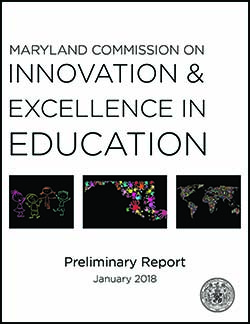Systems change in education is not for the faint of heart. And with the Every Student Succeeds Act (ESSA) rolling back the federal government’s footprint in education policy, states are now in the driver’s seat of education change. For many state and local education systems in the United States, nothing short of rethinking their entire education system, as daunting as that may seem, will produce the levels of high achievement, equity and efficiency that an increasingly interconnected world requires.
Maryland is one such state that has seen the changing dynamics taking shape in the world of work and has committed to doing what is necessary to bring its education system up to par with the best in the world.
In 2016, the Commission on Innovation and Excellence in Education was established by Governor Larry Hogan and the Maryland General Assembly with the twofold goals of modernizing the state’s education funding formula and identifying the changes needed in policies, practices and funding to enable Maryland to close the significant performance gap between its system and the world’s top-performing education systems.
 Since that time, the 25-member panel of elected officials, education stakeholders and business leaders have embarked on a research and public engagement effort unlike any since the 2000 Thornton Commission whose work this current Commission is charged with updating and building on. Commission chair and former University System of Maryland Chancellor, Dr. William “Brit” Kirwan oversaw the Commission’s 21 public meetings where the panel heard from students, parents, experts and advocates across the education spectrum.
Since that time, the 25-member panel of elected officials, education stakeholders and business leaders have embarked on a research and public engagement effort unlike any since the 2000 Thornton Commission whose work this current Commission is charged with updating and building on. Commission chair and former University System of Maryland Chancellor, Dr. William “Brit” Kirwan oversaw the Commission’s 21 public meetings where the panel heard from students, parents, experts and advocates across the education spectrum.
The Commission partnered with NCEE to conduct research into the world’s top- performing education systems, including systems in the United States that outperform Maryland, while Augenblick, Palaich and Associates (APA) supported the Commission on school finances issues.
“Given the nature of the global economy now and into the future, how can we expect to have a competitive economy or to provide our young people with the knowledge and skills they will need for success in their careers, if we don’t have an education system on a par with the best systems in the world,” said Commission Chair Kirwan.
Working hand-in-hand with Commission and state education policy staff, NCEE produced an extensive “gap analysis” for the Commission comparing how Maryland and top-performers organize and implement policies and practices across NCEE’s Nine Building Blocks for a World-Class Education System. The gap analysis, in tandem with expert testimony across the policy areas, then informed the Commission’s work in identifying and prioritizing its policy recommendations.
The Commission recently released its preliminary recommendations which fall within the following five broad areas:
 Invest in early childhood education so that all students reach kindergarten on track and ready to learn.
Invest in early childhood education so that all students reach kindergarten on track and ready to learn.- Provide significantly more support for at-risk students, particularly those with special education needs and those who come from communities of concentrated poverty.
- Increase the standards, expectations and compensation of teachers to ensure an abundant supply of highly qualified classroom instructors and create a leadership development system that provides prospective and current leaders with the support and skills to be successful managers and administrators.
- Develop more rigorous and better aligned curricula that enables graduates to be ready for college level work or earn an industry-recognized workforce credential.
- Institute a governance and accountability system with the authority to ensure the Commission’s recommendations are fully and faithfully implemented.
With the release of these preliminary recommendations, the Commission will begin the second phase of its work with NCEE and APA to develop an implementation and funding plan. The Commission will form working groups to focus on each of the policy areas and bring greater detail to the policies and strategies to be implemented by the state executive agencies and through legislation. Final recommendations from the Committee along with implementation and costing plans will be released later this year.
The full report, a more detailed summary of the preliminary recommendations and a draft of initial legislation that jump-starts the state’s investment into the policy changes recommended by the Commission is available on the Commission website.
 Invest in early childhood education so that all students reach kindergarten on track and ready to learn.
Invest in early childhood education so that all students reach kindergarten on track and ready to learn.



